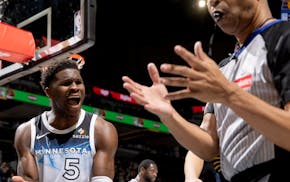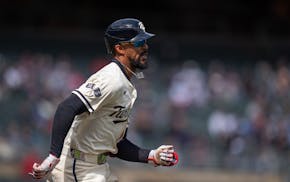Wes Walz found a video replay recently of the Wild's stunning upset of the Colorado Avalanche in Game 7 of the 2003 playoffs. One specific moment in that game has remained in his mind's eye all these years later.
Andrew Brunette's overtime winner? Yes, of course, but something else, too. Walz can't forget what tough guy teammate Matt Johnson did earlier in the game.
Johnson dived onto the ice headfirst to block a slap shot. The puck ricocheted off his helmet.
The play happened right in front of Walz on the bench.
"We were like, I cannot believe what I just saw," Walz recalled this past week. "It didn't really surprise us though."
This is just what hockey players do, especially in the Stanley Cup playoffs. They throw their bodies in front of pucks traveling at a high rate of speed, knowing the pain that comes with it is worth the investment to prevent a goal.
"These guys are brave, and they're committed to it, and that's what it takes to win," Wild General Manager Bill Guerin said. "You have to do it."
The long grind in pursuit of the Stanley Cup begins this weekend. The willingness to play while dealing with an assortment of injuries is part of hockey's fabric. Broken bones and torn ligaments become a badge of honor.
Blocking shots brings more bruises than glory, but along with it comes immense respect from peers. When an opponent winds up to take a slap shot, players don't even flinch in turning their body into a bull's-eye.
"It doesn't feel great," Wild defenseman Zach Bogosian said. "But with every good thing there is, there comes a little bit of pain."
Sure, players wear pads as protection, but pads don't cover every part of their body. And pucks have a dastardly way of finding exposed areas.
Every hockey player has personal stories about blocked shots.
Walz: "I cracked my cheekbone one year from getting a puck to the face."
Bogosian: "I've broken feet and hands and basically everything that you can think of."
Wild defenseman Jake Middleton: "There is a nerve on the outside of your knee. If it hits there, your whole leg kind of shuts down for about 10 minutes. That's a little scary."
Former Wild assistant coach Mike Ramsey: "I lost four teeth in Vancouver. I got it in the mouth. You know you lost teeth because you get that chalky [taste] in your mouth. You're going, 'That hurt, but I'm OK.' "
Blocks often happen when a player gets out of position and is scrambling to take away a shooting lane. Players say technique is involved but "you need a little bit of luck," Walz said.
"Hit you in the right spot," he said.
If it doesn't, this is how the scene normally unfolds: A player hobbles off the ice to the bench, disappears briefly down the tunnel to the locker room and then returns to the ice for a shift in a matter of minutes.
"If it hits you in a good spot, it doesn't really feel like anything," Middleton said. "If it hits you in a bad spot, it's a pretty agonizing pain. But it goes away quick."
Occasionally, the damage does not disappear quickly.
"They don't see you at home reading a book to your 5-year-old son with your leg elevated while you're icing," Walz said. "And then trying to get your foot in the boot the next day so you can play and do it again."
Walz called Ramsey one of the "best shot blockers of all time." The former NHL defenseman, Olympic gold medalist and Wild assistant said all players have specialties. His was blocking shots.
"It wasn't scoring goals," Ramsey joked.
Blocking shots is a skill, Ramsey said, that requires timing and technique. He honed his craft as a kid playing hockey with a tennis ball at Hiawatha Park in Minneapolis. Over time, blocking shots just became instinctive, not something that required a thought process.
The only difference?
"The puck hurt little bit more than a tennis ball," he said.
Ramsey noted that adrenaline in the moment serves a valuable purpose.
"If you got hit by pucks like that walking down the street, you would probably go to the hospital," he said. "But you're in a certain frame of mind and environment where it's, 'OK, I'm all right' and just keep going."
A comes-with-the-territory attitude exists in this area. Don't think, just react, deal with the pain, hope nothing gets broken.
"If you see something rolling in 90 miles per hour," Middleton said, "just get in front of it."
Said Wild captain Jared Spurgeon: "Some guys shoot harder than others."
The reaction to a timely block is universal. A jolt of emotion surges across a team's bench as a scoring change gets thwarted.
"It's probably one of the most selfless things you can do," Wild coach John Hynes said, "because you're putting yourself in harm's way for the good of the team."
A block shot prevents a goal, and one goal might be the difference in a game. Those plays become magnified in the playoffs because one goal can change an entire series.
"I know they pay goalies a lot of money now," Bogosian said, "but adding a second layer is always better than one."
Even if that means getting blasted in the foot or tasting broken teeth in their mouth.

Scoggins: Wolves must call on calm when the whistles favor the Lakers

Scoggins: After a sleepy start to the season, Twins are showing signs of life
Scoggins: Williams Arena needs to get a piece of its history back


![Joel Eriksson Ek celebrates his game-tying goal on Tuesday night at Xcel Energy Center.
] CARLOS GONZALEZ • carlos.gonzalez@startribune.com](https://arc.stimg.co/startribunemedia/4EZUA5C4T5BUJENUDQVI2ONJSE.jpg?w=600&h=600&auto=format%2Ccompress&cs=tinysrgb)